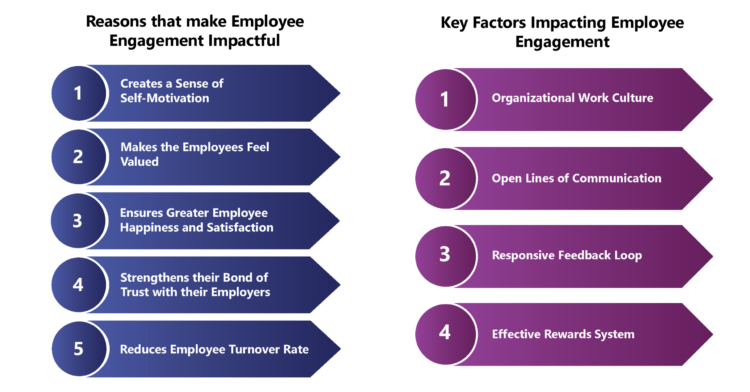1. Definition and Importance of Employee Engagement: Employee engagement goes beyond compensation and facilities; it involves how employees feel about their work and workplace, significantly impacting productivity, quality, and business success.
2. Key Benefits of Engagement: Engaged employees are self-motivated, feel valued, experience greater happiness and satisfaction, trust their employers, and contribute more effectively to business goals.
3. Reduces Turnover and Increases Quality: High engagement reduces turnover rates, minimizes disruptions, and maintains consistent productivity and quality.
4. Strategies to Improve Engagement: Building an inclusive culture, maintaining open communication, creating a responsive feedback loop, and implementing effective reward systems are essential for enhancing employee engagement.
Employees are an organization’s biggest asset. By driving business productivity and quality through employee engagement, organizations can gain a significant competitive advantage.
In fact, several studies have shown that workforce engagement is one of the key contributors to enhancing business growth and success even during the most challenging times.

Although employee engagement has become a buzzword today, most organizations still need to understand its meaning.
Many organizations still believe they can build an engaged workforce by offering the industry the best compensation and workplace facilities.
However, employee engagement includes much more than this. It is about how the employees feel about their work and workplace, and not just the financial benefits they receive.

Another research by Taleo Research suggested that highly engaged employees are twice likely to become top performers.

A similar study conducted across Fortune 100 companies found that the errors made by disengaged employees increased by a whopping 1000% as compared to the engaged employees.

Employee engagement can impact every aspect of business growth and profitability, especially the overall quality and productivity of the workforce.
This is evident from the fact that organizations with a more engaged workforce tend to enjoy a higher success rate as compared to organizations where the workforce engagement level is relatively lower.
Such employees remain loyal and dedicated to their organization, even during significant crises, such as a recession or a pandemic.
The key reasons that make employee engagement so deeply impactful are as follows:

Highly engaged employees feel motivated to contribute to business growth and success, beyond their gains.
Self-motivated employees are known to be more efficient at their work and are likely to commit fewer errors.
It enhances the overall quality, productivity, and efficiency of the output. In the long run, this can provide significant benefits for the business.

When organizations focus on improving their employees’ engagement, they send a positive message that they genuinely care about their employees.
By involving employees in crucial business decisions, organizations can demonstrate that they are significantly valued.
Hence, employees feel a sense of ownership and are inspired to put in their best to fulfill their goals efficiently.

Highly engaged employees tend to feel greater happiness and satisfaction at their workplace.
Such employees are not overburdened and are always eager to take up more challenging roles and responsibilities.
Being happier also makes it easier for employees to work harder and focus on delivering high-quality results, every single time.

When employees are highly engaged, it strengthens their trust in their employers and business leaders further.
They also feel assured about their professional growth and development within the organization.
This helps in improving their job security; so they can work wholeheartedly towards the goals assigned to them.
It, in turn, helps drive productivity and quality for the business through employee engagement.

One of the most significant ways employee engagement impacts quality and productivity is by reducing the turnover rate.
Employees who feel happy and satisfied with their work and environment are less likely to seek other job options.
This minimizes the chances of disruption in the business operations so that productivity and quality remain consistent.
Most organizations find the task of maximizing employee engagement to be a challenging one.
They need to develop strategies that are tailored to match the unique needs and motivations of their employees.
In this context, keeping the following key points that impact employee engagement in mind can prove beneficial:


Work culture impacts engagement in multiple ways.
This is why organizations need to focus on building a great culture that is inclusive and supportive.
Such a work culture makes employees feel valued and more willing to contribute to the business’s growth and success.

Open and frank communication between employees and management can significantly enhance engagement.
This requires the managers to make themselves easily accessible to all employees, including those opting to work from home.
Such communication is the key to building trust and making employees feel that their views and opinions matter.

Creating a responsive feedback loop helps employees to be aware of their strengths and shortcomings.
It allows employees to express their ideas and grievances and suggest improvements without fear or regret.

An effective employee rewards and recognition system helps organizations appreciate and celebrate the achievements and contributions of their employees.
It assures the employees that the organization recognizes their efforts and values their attitude, commitment, and excellence.
The above points can help organizations in driving business productivity and quality through employee engagement to maximize their business growth and profitability, and to stay ahead of the competition.

Lead author: Sagar Chaudhuri, the Co-Founder and CEO of HiFives. He is an HR Tech Evangelist with over 25 years of experience in both corporate and entrepreneurial settings. Previously, Sagar has held leadership roles with companies such as Genpact, Infosys, and ICICI Bank. He has an engineering degree from IIT Kharagpur and an MBA from IIM Lucknow. Connect on LinkedIn
To stay updated on the latest HiFives blogs, follow us on Twitter (@MyHiFives)